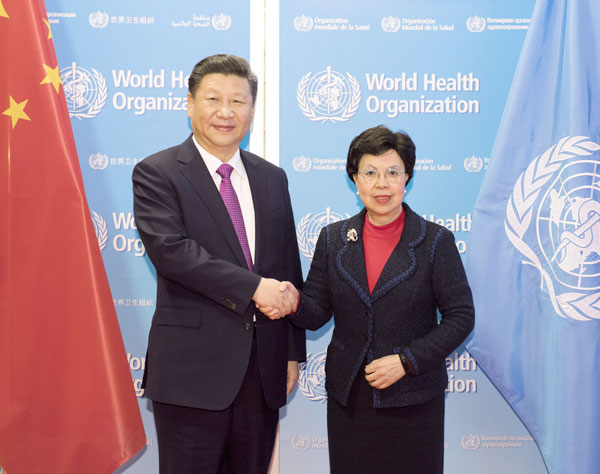China and WHO adopt transformative approach

 |
| Chinese President Xi Jinping (L) meets with World Health Organization (WHO) Director-General Margaret Chan in Geneva, Switzerland, Jan. 18, 2017. [Photo/Xinhua] |
China's President Xi Jinping and WHO's Director General Margaret Chan have agreed to bring a global health focus to economic development, starting with the One Belt One Road (OBOR) initiative supported by China. The OBOR initiative involves more than 60 potential countries, including WHO member states in which poor levels of public health limits the overall economic growth potential, and where new growth could strain a country's current ability to prevent and control diseases and provide basic health services.
In 2015 the international community committed to Sustainable Development Goals (SDGs), which call for transformative multi-sectoral approaches, cutting across the narrowly-defined interests of various disciplines and requiring smart, innovative responses to global challenges. With this agreement WHO and the government of China have taken a bold, concrete step towards realizing that commitment.
Public health is directly affected by growth – therefore growth strategies need to integrate health security and emergency response assistance to ensure sustainable growth. Globalization and global economic development have produced unprecedented economic gains and facilitated the movement of people and goods across borders. Unfortunately sometimes that movement has also brought diseases and viruses, along with increased pressure on national health systems to prevent and control disease outbreak, ensure adequate health services to increasingly urbanized populations, and ensure access to medicines and treatment for those living in poverty.
This agreement between WHO and China brings to international investments the same pledge the Chinese President made last year in announcing his Healthy China 2030 platform, which put health considerations at the core of domestic development decisions. WHO looks forward to working with member countries involved in the OBOR initiative to find ways to bring health considerations to their economic growth strategies and decision-making, and supporting expanded health services delivery and disease prevention and control capabilities.
The agreement is a result of decades of successful partnership between China and the WHO in global health cooperation. This includes sending 1,200 medial workers in response to the Ebola crisis in West Africa, China's recent contribution to WHO efforts to distribute medical supplies in Syria, and the WHO Emergency Medical Teams, a newly-established mechanism meant to ensure more flexible and rapid response to national outbreaks and disasters. China is a major contributor to the new initiative; one of its teams was already deployed to Nepal in supporting their earthquake response. In May 2016 the Chinese National EMT from Shanghai became one of the first EMTs globally to pass WHO's rigorous EMT classification process.



































